Song Kang-ho stars in Broker, a film about the black market for babies
An award-winning film explores child trafficking and the poignant reality of infants abandoned by their mothers.
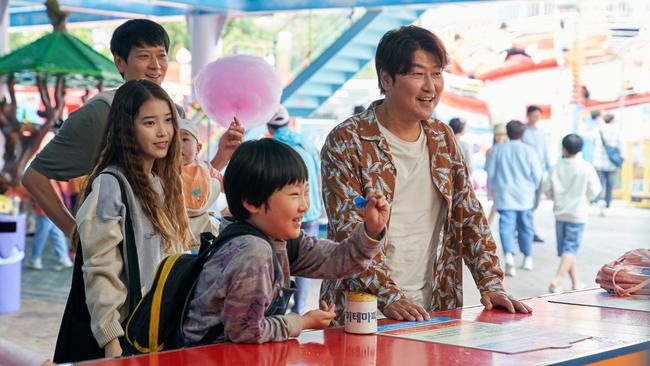
When Japanese director Hirokazu Kore-eda was making his 2013 film Like Father, Like Son – about babies who are switched at birth – he became fascinated by the existence of the baby box.
Typically located outside hospitals or churches, a baby box is a heated receptacle where mothers can leave unwanted babies to be safely adopted. It contains a baby basket and blankets, with soothing lullaby music piped in.
Baby boxes in different forms have been in use since at least the Middle Ages in Europe, and several countries have them today.
During his research for Like Father, Like Son, Kore-eda studied adoption and foster-care systems, and found that South Korea has 10 times as many baby boxes as Japan.
It’s one reason Kore-eda, Japan’s foremost contemporary filmmaker, decided to make his new film about baby trafficking in South Korea. The other reason is that for years he had wanted to work with South Korean actors, most prominently Song Kang-ho, the star of Bong Joon-ho’s award-winning 2019 film Parasite. Song was named best actor at the Cannes film festival last year for his role in Broker.
The story follows a pair of low-level child traffickers, Sang-hyeon (Song) and his assistant Dong-soo (Gang Dong-won), who work as volunteers at Busan’s Family Church. As is their practice, they abduct a baby from a baby box with the intention of selling it, believing they will give the baby a happier life.
The baby’s mother, Moon So-young (Lee Ji-eun), shows up and wants her baby back, but she soon decides that the money they will earn from the sale could be more interesting. With two detectives on their tail, the trio take off in a beat-up old van and try to sell the baby around South Korea. Along the way they pick up Hae-jin, a seven-year-old boy who has escaped from an orphanage.
“So you have one car with the baddies and the other with the detectives who are supposedly on the side of justice,” Kore-eda says. “But as they go on this journey, you realise that the villains of the piece are starting to become a family and starting to actually care for the baby – as the detectives do, too.”
He’s interested in the connections people make with each other.
“In Japanese society and in Korea as well, there’s this deep-rooted idea that a family is connected by blood,” he says.
“Anything else isn’t recognised as a family, by the social systems or by people in general. But I think our lives are changing, and at some point we’re going to start recognising that not all families are connected by blood.”
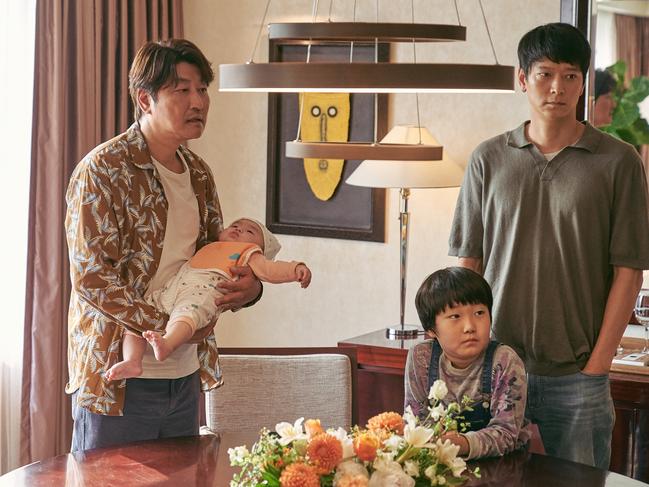
In his research into baby boxes, Kore-eda, 60, made some startling discoveries.
“I learned that when it comes to abortion, Korea is more conservative than Japan,” he says. “Korea had also become stricter with regards to adoption and sending children abroad, so adoption is now limited to adoptive parents within the country. Some people believe that may be responsible for the increasing number of babies being deposited in the baby boxes. So it was more controversial in Korea than in Japan, which is why I thought it would be significant to make the film in Korea.”
He felt sympathy for the baby-box babies. “People told me that children who had been abandoned in baby boxes often had grown up in children’s homes, not feeling wanted,” he says.
“I realised this is a problem for society. It’s not their problem. It’s not their mother’s problem. I really wanted to do something that would affirm their existence. I wanted to be able to do that for all children, including my own.”
He also wanted to deal with preconceived ideas about why women give up their children, such as the opinions expressed by the female detective, played by Doona Bae.
“At the beginning she says So-young shouldn’t have given birth if she was intending to give up the child and abandon it,” Kore-eda says. “So during the two hours of the film, the whole point is to try to open up people’s minds by peeling away the hard shell of several of the characters to show their more vulnerable, emotional side.”
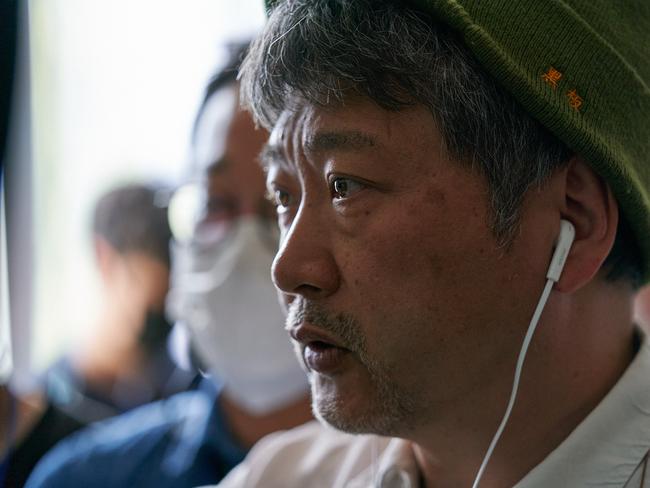
Kore-eda specialises in telling heartwarming personal stories. After his 2004 film Nobody Knows brought him to international recognition after its Cannes berth, his 2018 film Shoplifters took out the festival’s top prize, the Palme d’Or. The latter film focused on a family relying on shoplifting to survive a life of poverty in Japan and was inspired by reports he’d read. He says Broker is a companion piece to Shoplifters.
His 2018 success at Cannes led him to make his first foreign film, the French-language The Truth, featuring Juliette Binoche and Catherine Deneuve as a daughter and mother at loggerheads. Remarkably, it was the first time the two actors had been in a film together.
The writer-director often composes his films as he goes along, something the South Korean actors in Broker were not used to.
“There wasn’t a finalised script for the last third of the film and initially I planned for Song Kang-ho’s character to die after they have gone to Seoul,” he says.
“But looking at Song Kang-ho, I just thought this is not someone who’s going to die. So I rewrote that bit and showed it to him and then we went back and forth about four times to come up with the current ending.”
Where did he find the gorgeous baby in Broker with whom everyone falls in love? The baby is not a prop or a composite of several infants but a real character.
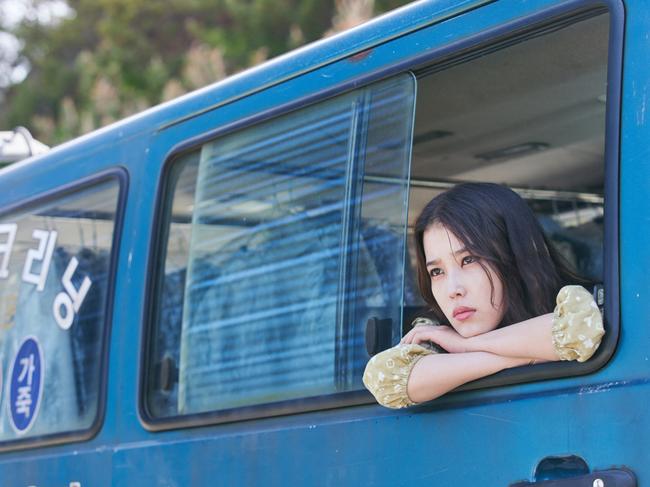
“It was just one baby,” Kore-eda says, incredulous at finding the infant named Woo-sung in the film. “We made a very detailed doll but didn’t use it. I’ve never come across such a collaborative baby. Because of coronavirus I couldn’t audition the babies directly. They had to be newborns, up to three months old. So I had five baby videos that I watched and I chose the one with the best reactions.
“During filming it helped that his parents were there the whole time because they were really helpful in controlling his rhythms. If he needed to be asleep in a scene, they would make sure that he was tired and if he needed to be fed in a scene they would make sure he was hungry.”
The chemistry between Song and the baby is palpable. A hugely expressive actor with a detailed approach and a gift for comedy, Song – who runs a laundry in the film – is seen at a sewing machine, ironing and hanging clothes.
“I shot so much footage of that and I didn’t use all of it, but just watching him do that is fascinating,” Kore-eda recalls with a laugh.
“There’s a bit where he chats to an old lady and one of the neighbours outside the laundry with the detectives in the car watching and I could have listened to them chat forever. Doona Bae’s policewoman was meant to be on stake-out, but she said the chat was so funny that she just started laughing in the car outside.”
Humour is a strong part of Kore-eda’s repertoire and audiences laugh, too, at watching Song – one of Asia’s biggest stars – as he completes his menial chores. “I intended to show that all life should be celebrated, even with the bad guys,” Kore-eda says.
The equally empathetic Song says all the characters in Broker are people who haven’t been happy in their lives.
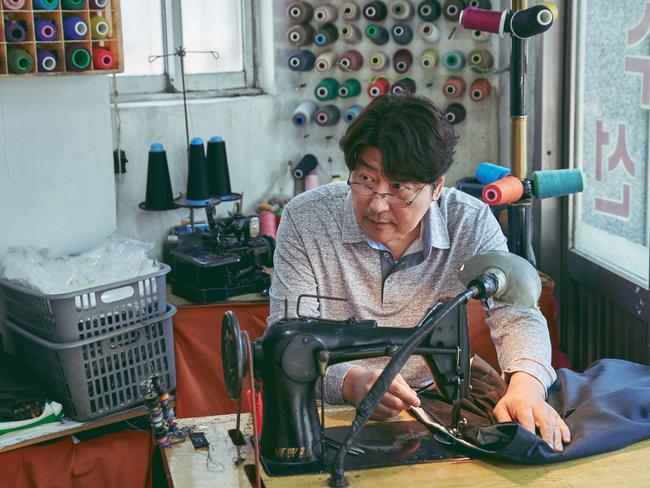
“They haven’t had a happy past or even have a happy present,” Song says. “Kore-eda shows us their daily life, which seems very ordinary, but also shows us the violence, the fears and the invisible suffering. All these things gradually build up in their lives, hence you see how in a subjective though distant world, how cold the world we live in is, and this really makes our hearts melt. This is something I understand.”
Whether Song works again with Kore-eda remains to be seen. For the moment, though, the director is busy. He has already shot another Japanese film, Monster, starring Sakura Ando, the star of Shoplifting, and then he plans to make another film abroad.
Would he work in English?
“There are a number of actors who I really respect and would like to work with and who work in the English language,” he says. “So if an opportunity comes along, yes, I would love to do that.”
Like who?
“I really like Michelle Williams and Emma Stone. Then there are a few of the actors I met here in Cannes, like Jake Gyllenhaal, Mads Mikkelsen and Viggo Mortensen. And I’d like to work again with Ethan Hawke (who played Binoche’s husband in The Truth). I’d like to work with Christian Bale. There are a lot of people I’d like to work with. I have big dreams.”
Broker screens in cinemas from March 30.

To join the conversation, please log in. Don't have an account? Register
Join the conversation, you are commenting as Logout